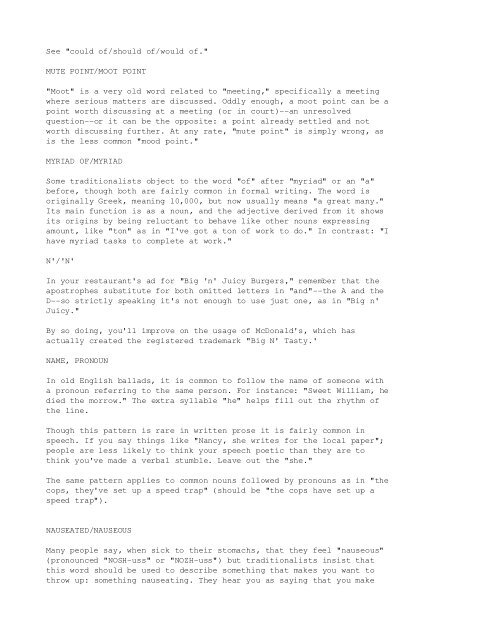Common_Errors_in_English_usage
Common_Errors_in_English_usage
Common_Errors_in_English_usage
Create successful ePaper yourself
Turn your PDF publications into a flip-book with our unique Google optimized e-Paper software.
See "could of/should of/would of."<br />
MUTE POINT/MOOT POINT<br />
"Moot" is a very old word related to "meet<strong>in</strong>g," specifically a meet<strong>in</strong>g<br />
where serious matters are discussed. Oddly enough, a moot po<strong>in</strong>t can be a<br />
po<strong>in</strong>t worth discuss<strong>in</strong>g at a meet<strong>in</strong>g (or <strong>in</strong> court)an unresolved<br />
questionor it can be the opposite: a po<strong>in</strong>t already settled and not<br />
worth discuss<strong>in</strong>g further. At any rate, "mute po<strong>in</strong>t" is simply wrong, as<br />
is the less common "mood po<strong>in</strong>t."<br />
MYRIAD OF/MYRIAD<br />
Some traditionalists object to the word "of" after "myriad" or an "a"<br />
before, though both are fairly common <strong>in</strong> formal writ<strong>in</strong>g. The word is<br />
orig<strong>in</strong>ally Greek, mean<strong>in</strong>g 10,000, but now usually means "a great many."<br />
Its ma<strong>in</strong> function is as a noun, and the adjective derived from it shows<br />
its orig<strong>in</strong>s by be<strong>in</strong>g reluctant to behave like other nouns express<strong>in</strong>g<br />
amount, like "ton" as <strong>in</strong> "I've got a ton of work to do." In contrast: "I<br />
have myriad tasks to complete at work."<br />
N'/'N'<br />
In your restaurant's ad for "Big 'n' Juicy Burgers," remember that the<br />
apostrophes substitute for both omitted letters <strong>in</strong> "and"the A and the<br />
Dso strictly speak<strong>in</strong>g it's not enough to use just one, as <strong>in</strong> "Big n'<br />
Juicy."<br />
By so do<strong>in</strong>g, you'll improve on the <strong>usage</strong> of McDonald's, which has<br />
actually created the registered trademark "Big N' Tasty.'<br />
NAME, PRONOUN<br />
In old <strong>English</strong> ballads, it is common to follow the name of someone with<br />
a pronoun referr<strong>in</strong>g to the same person. For <strong>in</strong>stance: "Sweet William, he<br />
died the morrow." The extra syllable "he" helps fill out the rhythm of<br />
the l<strong>in</strong>e.<br />
Though this pattern is rare <strong>in</strong> written prose it is fairly common <strong>in</strong><br />
speech. If you say th<strong>in</strong>gs like "Nancy, she writes for the local paper";<br />
people are less likely to th<strong>in</strong>k your speech poetic than they are to<br />
th<strong>in</strong>k you've made a verbal stumble. Leave out the "she."<br />
The same pattern applies to common nouns followed by pronouns as <strong>in</strong> "the<br />
cops, they've set up a speed trap" (should be "the cops have set up a<br />
speed trap").<br />
NAUSEATED/NAUSEOUS<br />
Many people say, when sick to their stomachs, that they feel "nauseous"<br />
(pronounced "NOSHuss" or "NOZHuss") but traditionalists <strong>in</strong>sist that<br />
this word should be used to describe someth<strong>in</strong>g that makes you want to<br />
throw up: someth<strong>in</strong>g nauseat<strong>in</strong>g. They hear you as say<strong>in</strong>g that you make





